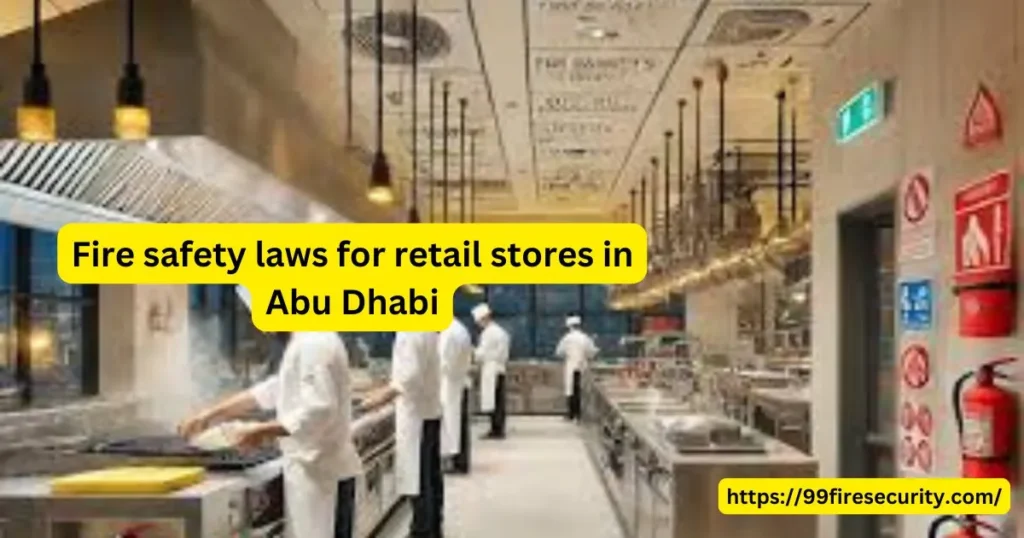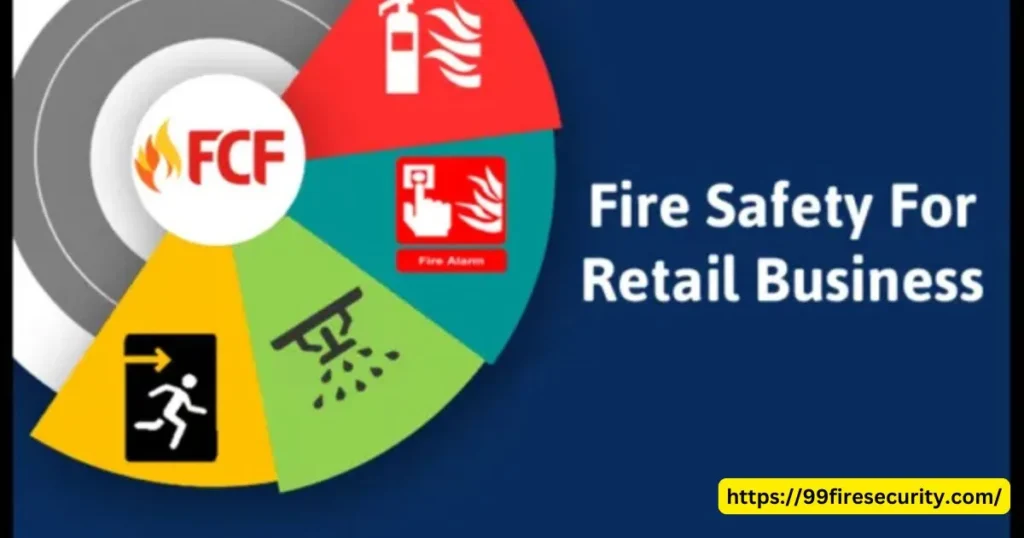Introduction:
In Abu Dhabi, fire safety laws is a significant issue for retail store owners. The emirate boasts modern infrastructure and vibrant commercial areas, and it has strict fire safety laws to protect lives, property and the environment. These laws must be followed by retailers in order to reduce the risk of fire and provide a safe working environment for employees and customers.
The UAE’s fire safety laws place importance on prevention, state-of-the-art fire-fighting systems and public awareness initiatives. Retailers will need to know the main laws, follow the guidance, and have effective fire safety laws and precautions in place.” Let’s get into the nitty-gritty details.
Regulatory Bodies and Framework
Fire safety laws in the emirate are enforced by the Abu Dhabi Civil Defence, which is the main authority involved. It ensures that retail stores comply with safety standards, audits them, and approves them for operation.
Important Fire Safety Codes and Standards in UAE
The Fire and Life Safety Code of Practice maintained by the UAE is an exhaustive set of standards detailing fire prevention, protection, and response protocols. This code is mandatory for retailers to follow in order to operate legally.
Collaboration with Local Governments
Store owners in the retail industry partner with the local municipalities to make sure they adhere to the fire safety permits and approvals to get started with store setting up or any renovations.
Key Fire Safety Requirements for Retail Stores
Fire Alarm and Detection Systems
Fire detection and alarms systems for retail stores Fire detection and alarms systems are advanced methods that are implemented to recognize and alert users in case of a fire. These systems are also essential for the fast evacuation of people.
Fire Suppression Systems
Standpipe(s) — Automatic sprinkler systems, fire hydrants, and portable extinguishers shall be provided in accordance with this code to control and extinguish fire in retail spaces.
Emergency Exits & Evacuation Routes
You’re absolutely right clear and accessible emergency exits are key. Retailers are also required to post evacuation maps and ensure the pathways are clear in the event of a quick exit.
Fire Safety Equipment Standard Compliance
What Types of Fire Extinguishers Are Required
Fire extinguishers must be based on the particular kind of threat in each retail store, such as Class A for common fires, Class B for even more severe fires flammable liquid fires, such as gasoline or oil, or Class C for electric fires.
Placement and Accessibility of Fire Extinguishers
Fire extinguishers should be always be readily accessible, particularly in areas that pose a high risk, such as kitchens or storerooms.
Equipment Inspections and Maintenance
Fire protection systems must be inspected and maintained routinely. There can be penalties and higher risks of fire for not complying.
Fire Safety training and awareness
Employee Training Programs
The employees of a retail store need to be trained on fire safety laws and usage of extinguishers, evacuation procedures, and contact numbers in case of a fire.
Fire Drills and the Importance of Emergency Preparedness
- Testing preparedness once in a while via fire drills help us to react in case of an emergency and save time.
- You only get off a plane when the captain stops it on the ground.
- Abu Dhabi authorities conduct awareness campaigns to help retailers understand fire safety laws and best practices.
Fire Prevention through Building and Structural Safety
Potential Use of Fire-Resistant Materials
Fire-Resistant Building Materials: Retail stores need to use fire-resistant building materials, including non-combustible walls and ceilings, to prevent the spread of fire. This provides added protection for customers, employees and products.”
A Fire Compartmentalization and Barriers
The repair work can run into the thousands and take months to complete, as virtually all fire damage minimization is done through compartmentalization. Fire barriers — flame- and smoke-resistant doors, for instance, and walls — help compartmentalize the flames and smoke, providing precious minutes to evacuate and do battle with the fire.
Patient and Staff Smoke Control and Adequate Ventilation
Ventilation systems and smoke extraction units play a crucial role in smoke management in the event of fire. They keep visibility and reduce the risk of suffocation while escaping.
Fire safety inspections and fire risk assessments
The Significance of Conducting Periodic Risk Assessments
Fire risk assessments are required to be carried out by retail stores. It assists in detecting possible dangers and also makes sure that preventive acts have already been taken.
- Measure Fire Safety laws Audit: The steps to assess potential fire hazards
- Recognize fire triggers (flammable materials, electrical faults).
- Evaluate who is at risk (staff, customers, contractors).
- Assess existing fire protection strategies.
- Record results and make adjustments.
Documentation and Reporting
Fire safety records are typically broken down into it areas: Equipment Maintenance: If a retailer provides their own fire safety equipment, such as fire extinguishers and fire blankets, they must regularly maintain and test the equipment to ensure its effectiveness. These documents are also being demanded during inspections by authorities.

Legal Consequences of Non-Compliance
Fines and Penalization as per UAE Law
Violations on fire safety laws requirement compliance by retailers can attract heavy penalties for offenders, which can go up to AED 500 or beyond that to several tens of thousands of dirhams, depending on the degree of the mistake.
Shuttering Of Retail The Shops For Violating
Recurrent contraventions could lead to the business being closed temporarily or permanently. Such actions are made in the concern for public safety.
Civil liability and insurance consequences
Insurance claims could potentially be voided in the event of a fire if the store didn’t comply with fire safety laws, which could open up the owner to financial ruination.
Update Fire Safety for High-Risk Retail Environments
Handling Flammable Materials
Stores handling items such as paints, chemicals or any other flammable products are subject to strict storage guidelines, such as the use of fireproof cabinets and safety distances.
Special Considerations for Malls and Large Complexes
The retails within the mall, they need to work with the property management to ensure that centralize fire safety systems are operational and routinely checked.
Storage and Inventory Management Practices
Inappropriate inventory organization and excessive storage can lead to fire hazards. Retailers should keep appropriate clearance around sprinklers and should not block fire exits.
Tech brings through in Fire Safety
IoT is used in fire detection systems
IoT sensors enable smart fire detection systems that can generate real-time alerts about fires and automatically notify authorities in case of emergencies.
Smart Fire Alarm Systems
These advanced alarm systems can differentiate between false alarms and real threats, preventing unnecessary disruptions in retail operations.
Surveillance Monitoring and Monitoring Tools
With the help of AI-enabled surveillance cameras, businesses can detect signs of fires like smoke or suspicious heat patterns and alert their staff in real time.

Authority Awareness Campaigns
Key Initiatives of Abu Dhabi Civil Defence
The Abu Dhabi Civil Defence regularly conducts workshops and campaigns to educate retailers and the public on fire safety laws and practices.
Community Engagement Programs
Participate in a fire safety laws seminar and other events to cultivate a culture of preparedness for retail store owners.
Educational Content for Retailers
Retailers are provided fire safety laws guidelines and related brochures and online support to understand and tailor measures to improve safety.
Fire Safety Compliance Insurance Requirement
And finally, the role of insurance in fire safety.
For retail stores, fires can be devastating, but the insurance is a financial safety net that compensates for the damage. But insurance companies demand that fire safety laws are strictly adhered to before they issue policies.
How Compliance Affects Insurance Premiums
Retailers who are compliant with fire safety laws present a lower risk to insurers and typically pay lower premiums.
What to Do in Case of a Fire Incident to Claim Insurance
If a fire breaks out, retailers need to carefully document the damage, file a police report, and provide evidence that they are following safety regulations to help speed up insurance claims.
In this context, the following is also true:
Common Barriers to Compliance
Small businesses have some challenges such as budget limitations, unawareness and the inability to afford advanced fire protection equipment.
Financial Impact for Small Merchants
Implementing fire safety measures can be expensive for small retailers, but government subsidies and support programs might alleviate costs.
Overcoming Cultural and Behavioral Barriers
It is quite difficult to influence attitudes by raising awareness in areas with many different cultures and customs where fire safety laws is concerned.
Fire Safety Compliance in Action: Success Stories
Case Studies from Abu Dhabi Retail Stores
With implementation of proper fire safety laws and measures, many retail stores in Abu Dhabi are now i.e., low fire risk sectors can be marked as incident free sectors as they are not involved in any fire incident despite of being high fire risk sector.
Insights from Previous Fire Incidents
Earlier fire incidents in the UAE have highlighted the need for rapid response systems and well-trained employees.
Spotlighting Successful Strategies
It includes the stores that provide a good example for the industry by keeping fire regulations up to date, monitoring their equipment and conduct regular training sessions.
Impact of Advanced Technologies on Fire Safety Regulations
Regulatory bodies are updating the fire safety codes to incorporate the latest technology and the increased risk of modern-day retail spaces.
Impacts of AI and New Technology
Enhanced fire safety in retail spaces: Fire prediction, Preventions &Response are most likely under the umbrella of Artificial Intelligence.
Making Abu Dhabi Fire-Safe: A Vision
The government wants to ensure a conducive business environment without threatening lives and property with fire.
Conclusion
Fire Safety Rules are a crucial aspect of business setup Abu Dhabi retail. Implementing these regulations allows retailers to keep their employees, customers, and assets safe,… Compliance is not merely a legal duty; it is a moral imperative. Get the appropriate systems, train your employees and never stop paying attention to fire safety.

FAQs
How often to inspect fire safety equipment?
Consult with a leading fire services company to schedule bi-annual inspections of your fire safety equipment by qualified professionals.
Abu Dhabi: what are the penalties for not complying with the fire safety laws?
Penalties can include large fines, and in the worst case, the retail store may be shut down.
The training programs for fire safety are compulsory?
Yes, fire safety laws training is compulsory for employees to retail stores in order to make them prepared during the fire incident.
What fire safety standards should new retail stores be aware of?
In this specific case, new stores are required to follow the guidelines outlined in the UAE Fire and Life Safety Code for complying with the necessity for adequate fire detection, use of fire resistant materials, and development of emergency plans.
How can tech help us mitigate fire hazards?
IoT sensors, AI surveillance, and smart alarms are advanced technologies that improve fire detection, response times, and the overall safety of retail settings.


